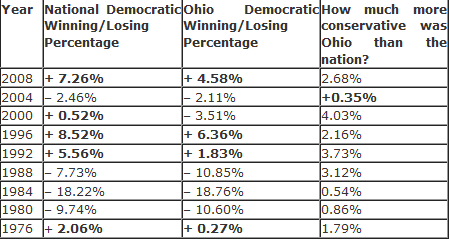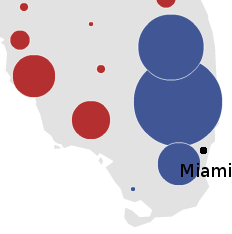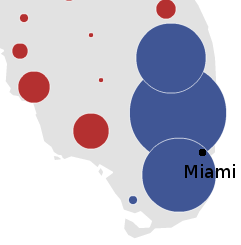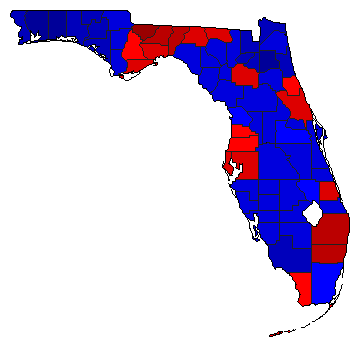By: Inoljt, http://thepolitikalblog.wordpr…
Is Ohio a liberal place? Or is it a conservative place?
I suspect far more people would say the latter rather than the former.
In many respects, Ohio is politically similar to Florida. Both are well-known swing states that hold a bountiful electoral prize. Both lean Republican. Both have large cites that function as pools of Democratic votes. Both also have considerable rural, Republican regions.
But in other ways they could not be more different. Sunny Florida is diverse, growing, and service-oriented. While Florida often votes Republican, it is not exactly conservative. Cold, northern Ohio is a rust-belt giant. It is not very diverse. It is definitely not growing. Florida is new. Ohio is old and conservative.
For the moment Ohio is a bit more conservative than the country at large. For the past eight out of nine presidential elections, it has been a bit redder than the nation. Not much redder, but enough to be noticeable.

I do not think that the future looks bright for the Democratic Party in Ohio. The two are moving in opposite directions. Demographically, Ohio is staying static while the country at large changes. And there are not many truly liberal spots in Ohio – places like Boulder, CO or Seattle. There never were.
Ohio has a lot of unionized, working-class folk who are still voting against Herbert Hoover; they are a core part of its Democratic base. I am not sure how long they will continue to support a party that is becoming, quite frankly, fairly upper-class in ethos. People in West Virginia certainly don’t anymore.
Not that Ohio is doomed to become a Republican stronghold. Places like Columbus are rapidly turning blue, perhaps fast enough to offset losses in working-class counties. And it isn’t inevitable that those counties will start voting Republican. If West Virginia is a prime example of working-class voters who deserted the Democratic Party, Michigan is a prime example of working-class voters that still support it. Barack Obama won a landslide in that state.
Nevertheless, my gut still tells me that Ohio and the Democratic Party are shifting farther and farther away from each other. These things can reveal themselves very quickly in politics. In 1988, California was a red state that had voted Republican for six elections in a row. Then one day it was won by Bill Clinton – and it has never gone back since then. In 1996 West Virginia had gone blue for five out of the past six elections. Then George Bush won the state – and now we consider it a rock-hard Republican state.
That may be the fate of Ohio.
 Cooper makes it clear that he has ideas. He isn’t just going to run an anti-Gillibrand campaign, but he can’t help but point out her record. He mentions her past ties to Big Tobacco, the 100 percent rating she received from the National Rifle Association and her evolution on numerous issues that could be perceived as politically convenient.
Cooper makes it clear that he has ideas. He isn’t just going to run an anti-Gillibrand campaign, but he can’t help but point out her record. He mentions her past ties to Big Tobacco, the 100 percent rating she received from the National Rifle Association and her evolution on numerous issues that could be perceived as politically convenient. 

